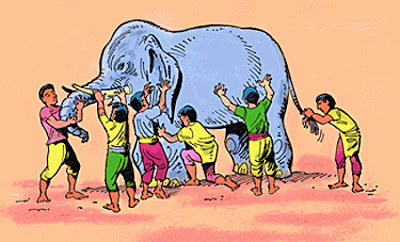If you want to show them what you see - how will you do that?
If your purpose is to persuade your audience to see things your way - what will you do if they are blind? Often your audience is blind to your message. This old poem by John G. Saxe is a good reality reminder. Not everyone can see things the way you do. By the way, I used this poem as an example when I delivered an important explanation to our cynical corporate auditors about our procedures. This poem saved my skin.
Your audience is blind until you open their eyes. If they don't see - it's your fault not theirs.
The Blind Men and The Elephant
It was six men of Indostan,
To learning much inclined,
Who went to see the elephant (Though all of them were blind),
That each by observation Might satisfy the mind.
The first approached the elephant,
And, happening to fall
Against his broad and sturdy side,
At once began to bawl;
'God bless me! but the elephant Is very like a wall!'
The second, feeling of the tusk,
Cried: 'Ho! what have we here
So very round and smooth and sharp?
To me 'tis mighty clear
This wonder of an elephant
Is very like a spear!'
The third approached the animal,
And, happening to take The squirming trunk within his hands,
Thus boldly up and spake:
'I see', quoth he,' the elephant Is very like a snake!'
The fourth reached out his eager hand,
And felt about the knee:
' What most this wondrous beast is like Is mighty plain,'quoth he;
' Tis clear enough the elephant Is very like a tree!'
The fifth, who chanced to touch the ear,
Said: 'E'en the blindest man
Can tell what this resembles most;
Deny the fact who can,
This marvel of an elephant Is very like a fan!'
The sixth no sooner had begun
About the beast to grope,
Than, seizing on the swinging tail
That fell within his scope,
'I see', quoth he, 'the elephant
Is very like a rope!'
And so these men of Indostan
Disputed loud and long,
Each in his own opinion
Exceeding stiff and strong,
Though each was partly in the right
And all were in the wrong
—John Godfrey Saxe
It was six men of Indostan,
To learning much inclined,
Who went to see the elephant (Though all of them were blind),
That each by observation Might satisfy the mind.
The first approached the elephant,
And, happening to fall
Against his broad and sturdy side,
At once began to bawl;
'God bless me! but the elephant Is very like a wall!'
The second, feeling of the tusk,
Cried: 'Ho! what have we here
So very round and smooth and sharp?
To me 'tis mighty clear
This wonder of an elephant
Is very like a spear!'
The third approached the animal,
And, happening to take The squirming trunk within his hands,
Thus boldly up and spake:
'I see', quoth he,' the elephant Is very like a snake!'
The fourth reached out his eager hand,
And felt about the knee:
' What most this wondrous beast is like Is mighty plain,'quoth he;
' Tis clear enough the elephant Is very like a tree!'
The fifth, who chanced to touch the ear,
Said: 'E'en the blindest man
Can tell what this resembles most;
Deny the fact who can,
This marvel of an elephant Is very like a fan!'
The sixth no sooner had begun
About the beast to grope,
Than, seizing on the swinging tail
That fell within his scope,
'I see', quoth he, 'the elephant
Is very like a rope!'
And so these men of Indostan
Disputed loud and long,
Each in his own opinion
Exceeding stiff and strong,
Though each was partly in the right
And all were in the wrong
—John Godfrey Saxe
Presentation Tips on Twitter Presentation Skills Club on Facebook
Executive Speech Coach, Business presentation tips from George Torok, the Speech Coach for Executives

No comments:
Post a Comment